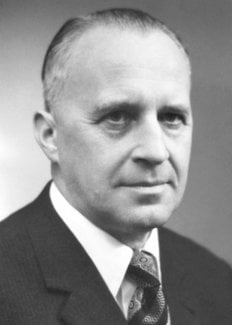Ernst Otto Fischer
Biographical
Translation from the German text

I was born in Solln, near Munich, on 10 November 1918 as the third child of the Professor of Physics at the Technical College of Munich, Dr. Karl T. Fischer (died 1953), and his wife, Valentine, née Danzer (died 1935). After completing four years at elementary school I went on to grammar school in 1929, from which I graduated in 1937 with my Abitur. Following a subsequent period of “work service” and shortly before the end of my two years’ compulsory military service, the Second World War broke out. I served in Poland, France and Russia. In the winter of 1941/2 I began to study Chemistry at the Technical College in Munich during a period of study leave. I was released by the Americans in the autumn of 1945, and resumed my study of Chemistry in Munich after the reopening of the Technical College in 1946. I graduated in 1949. I took up a position as scientific assistant to Professor Walter Hieber in the Inorganic Chemistry Department, and under his guidance I dedicated myself to working on my doctoral thesis, “The Mechanisms of Carbon Monoxide Reactions of Nickel II Salts in the Presence of Dithionites and Sulfoxylates”. After receiving my doctorate in 1952, I was invited by Professor Hieber to continue my activities at the college and consequently chose to specialise in the study of transition metal and organo-metallic chemistry. I wrote my university teaching thesis on “The Metal Complexes of Cyclopentadienes and Indenes”. I was appointed a lecturer at the Technical College in 1955 and in 1956 I completed a scientific sojourn of many months in the United States. In 1957 I was appointed Professor at the University of Munich. After turning down an offer of the Chair of Inorganic Chemistry at the University of Jena I was appointed Senior Professor at the University of Munich in 1959 . In 1957 I was awarded the Chemistry Prize by the Göttingen Academy of Sciences. The Society of German Chemists awarded me the Alfred Stock Memorial Prize in 1959. In 1960 I refused an appointment as Senior Professor in the Department of Inorganic Chemistry at the University of Marburg. In 1964 I took the Chair of Inorganic Chemistry at the Technical College of Munich, which had been vacated by Professor Hieber. In the same year I was elected a member of the Mathematics/Natural Science section of the Bavarian Academy of Sciences; in 1969 I was appointed a member of the German Academy of Scientists Leopoldina. In 1972 I was given an honorary doctorate by the Faculty of Chemistry and Pharmacy of the University of Munich.
Lectures on my fields, particularly those on metallic complexes of cyclopentadienes and indenes, metal-p-complexes of six-ringed aromatics, mono-, di- and oligo-olefins and most recently metalcarbonyl carbene and carbyne complexes, led me on lecture tours of the United States, Australia, Venezuela, Brazil, Israel and Lebanon, as well as numerous European countries, including the former Soviet Union. In 1969 I was Firestone Lecturer at the University of Wisconsin, Madison,Wisconsin, USA; in 1971 Visiting Professor at the University of Florida, Gainesville, USA, as well as the first Inorganic Chemistry Pacific West Coast Lecturer. In the spring of 1973 I held lectures as the Arthur D. Little Visiting Professor at the Massachusetts Institute of Technology, Cambridge, Massachusetts, USA; and that was followed by a period when I was Visiting Distinguished Lecturer at the University of Rochester, Rochester, New York, USA.
This autobiography/biography was written at the time of the award and first published in the book series Les Prix Nobel. It was later edited and republished in Nobel Lectures. To cite this document, always state the source as shown above.
Ernst Otto Fischer died on July 23, 2007.
Nobel Prizes and laureates
Six prizes were awarded for achievements that have conferred the greatest benefit to humankind. The 14 laureates' work and discoveries range from quantum tunnelling to promoting democratic rights.
See them all presented here.
